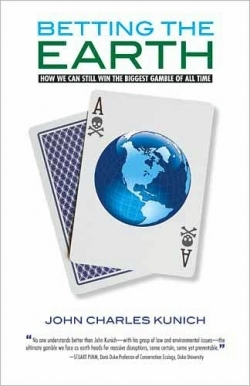Betting the Earth
How We Can Still Win the Biggest Gamble of All Time
According to environmental law professor John Charles Kunich, uncertainty and “the unknown” are at the heart of the human tendency toward inaction in the face of looming environmental crises. In Betting the Earth, he examines the way political and cultural inertia informs responses to threats of mass extinctions and global climate change.
The quest for incontrovertible answers to persistent questions about “when” and exactly “how” we’ll be affected by these twin challenges is costing humans and the earth more time than can be reasonably gambled, given what is already known. And yet there is much that scientists and scholars do not yet know—in part because some things simply cannot be known—but also because modeling, testing, and analysis of data results in probabilities more often than certitudes. Meanwhile, doubters and others who balk at proposals to address environmental crises point to gaps in knowledge as an excuse to dismiss serious action. Kunich argues that this is a risky bet when what is needed is a winning bet.
Recognizing the context and the need for strategic decision making, Kunich considers how luminaries in the fields of logic, mathematics, philosophy, and theoretical physics can contribute. He surveys the ideas of Blaise Pascal, Kurt Gödel, and Werner Heisenberg, and finds that theories of uncertainty, game theory, and risk analysis can help world leaders and decision makers come to terms with the persistent unknowns in the current environmental debate. Kunich also borrows the best from each of these revered thinkers for the “World Wager” and decision matrix, his own innovative tools for parsing decisions in the face of incomplete information. With a grounding in scientific method, he believes that analysis of the available—if incomplete—evidence can help leaders make momentous decisions that result in the best bet: “When you’re gambling with what you absolutely can’t afford to lose, you can’t afford to push all-in blind, in the dark. If there ever were a betting decision where you want every light on, every distraction shut out, and expert advice from the best possible minds, this is it.”
The lengthy index and footnotes suggest a well-researched effort by a qualified professional whose legal and writing career spans decades of work on biodiversity and environmental issues. Kunich asks readers to do some heavy intellectual lifting, but his prose style is readable and the tone is both conversational and pedagogical and not unlike a college course with each chapter presented much the way a lecture might be. This format anticipates the skeptics as well as the uninitiated and is addressed to readers who are motivated to understand difficult issues but may also need a tour through the rudiments first.
Reviewed by
Holly Wren Spaulding
Disclosure: This article is not an endorsement, but a review. The publisher of this book provided free copies of the book to have their book reviewed by a professional reviewer. No fee was paid by the publisher for this review. Foreword Reviews only recommends books that we love. Foreword Magazine, Inc. is disclosing this in accordance with the Federal Trade Commission’s 16 CFR, Part 255.

